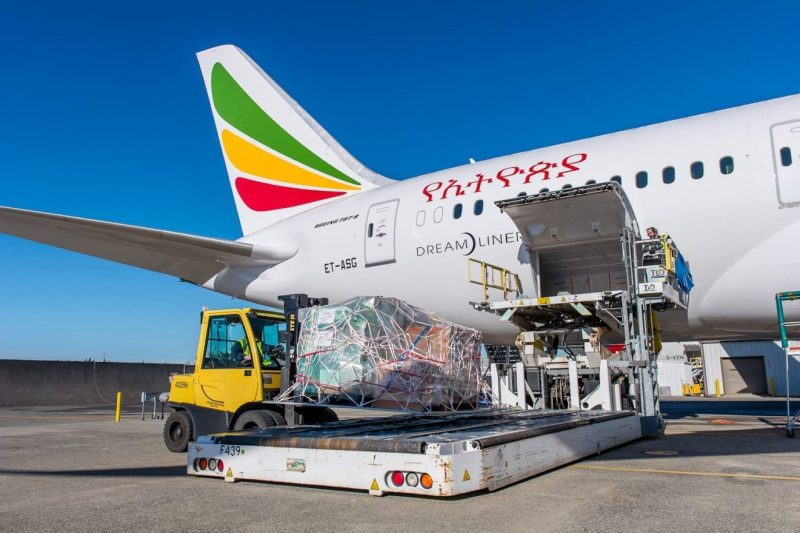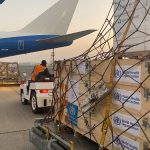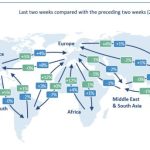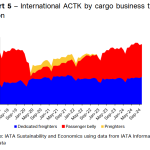Ethiopian Cargo Africa's lifeline
By 2025, the cargo airline envisions its annual revenues to reach $2.37 billion handling cargo volumes of as much as 1.6 million tons and serving 70 international destinations.
“14 dedicated freighters as of today and they include nine Boeing 777F; four Boeing 737-800BCF; and one Boeing 767-300BDSF and these are helping in capacity expansion, on top of our belly capacity which has gradually opened up as travel restrictions are easing up. We are still using 11 passenger to freight aircra (eight wide-bodied and three narrow-bodied P2F) which have been configured for cargo, albeit temporarily. We will be geing deliveries of three Boeing 767- 300BCF next year and another Boeing 767-300BDSF soon.”
As a strategic business unit of the group, Ethiopian Cargo & Logistics Services has significantly contributed to the total profit of the group which stood at US$900 million.
Ethiopian Airlines is the only airline in the African continent to operate a fleet of over 130 international
passenger and cargo aircraft. Its subsidiary, Ethiopian Cargo & Logistics Services, is a significant revenue driver for the Group. And Addis Ababa is fast emerging as the ‘smart logistics hub’ in the whole of Africa. Needless to say, it has grown enormously that it is now considered among the top 50 airlines in the world.
By 2025, the leading aviation group in the continent envisions to operate at least seven business units: Ethiopian International Services; Ethiopian Cargo & Logistics Services; Ethiopian MRO Services; Ethiopian Aviation Academy; Ethiopian ADD Hub Ground Services, Ethiopian Airports Services and Ethiopian Express Services
(Domestic).
Giving a perspective of the work in progress at Ethiopian Cargo is its Managing Director, Abel Alemu, who spoke to Air Cargo Update on the sidelines of the recently held World Cargo Symposium in London. Excerpts of our interview below:
Post-pandemic, what is the emerging picture for Ethiopian Cargo?
The aviation sector, like most other sectors, was impacted majorly. However, the cargo segment was very active, transporting medicines and other humanitarian relief materials. I can confidently say that the past few years have been highly lucrative for cargo business. As a strategic business unit of the group, Ethiopian Cargo & Logistics
Services has significantly contributed to the total profit of the group which stood at US$900 million. The cargo unit with dedicated freighters, charters and belly freight accounts for a large chunk of the group’s revenues.
What has been the growth year-on-year for the cargo segment?
The growth has been tremendous not just in revenue but also general uplift. We are focused on four major areas – fleet acquisition, infrastructure development, network expansion and human capital. We have 14 dedicated freighters as of today and they include nine Boeing 777F; four Boeing 737-800BCF; and one Boeing 767-300BDSF and these are helping in capacity expansion, on top of our belly capacity which has gradually opened up as travel restrictions are easing up. We are still using 11 passenger to freight aircraft (eight widebodied and three narrow-bodied P2F) which have been configured for cargo, albeit temporarily. We will be getting deliveries of three Boeing 767-300BCF next year and another Boeing 767-300BDSF soon.
Where are the new freighters going to be deployed?
The new freighters will get delivered by September next year and they will cover existing routes to address demand. There will be frequency adjustments and we will also look at new markets. The United Arab Emirates (UAE) is a growing market and we are strong there, thus, the focus will be in the Middle East. In the interim the Boeing 767-300BDSF which we are converting with the help of Israel Aerospace Industries (IAI) will be delivered and that will be deployed in the Middle East, Indian sub-continent and south Europe.
Besides fleet acquisition, you did mention three other focus areas, could you give some details on the same?
We are investing heavily in infrastructure development in Addis Ababa, intending to become a world class ‘smart logistics hub’, serving not just African continent but the region as a whole. The new distribution facility is designed to help e-commerce business and will be operational by June 2023. It is a huge project with an investment of nearly US$50 million and it will be one of the most modern and efficient logistics platform in this part of the world.
Another focus area is network expansion. We have 66 freighter destinations and 130 passenger destinations and we are continuously expanding. By far, we are the largest operator in Africa. We fly to Brazil, Chile, Ecuador, Miami, Mexico, the Indian sub-continent, Indonesia and many more destinations across continents. We have a combination of 40 flights in and out of China, both passenger and dedicated freighters, though some of them have been affected due to the pandemic. In India, we have daily freight schedule from Mumbai and wide-body aircraft flights through Delhi, Bengaluru and Chennai.
The fourth focus area is investment in digitization and human capital. We have introduced online booking, tracking and tracing systems, etc., and we are working with our technology partners to expand our digital footprint, to facilitate further seamless movement of cargo and the processes.
With such investments, what has been the returns?
Like I said, we are profitable and cargo is going to be critical component of the group business. Our vision 2025 envisages annual revenues of US$2.97 billion (US$2.37 from dedicated freighters) carrying a total tonnage of about 1.6 million and serving 70 international destinations. Ethiopian Cargo will be one among the top 20 cargo airlines in the world in terms of FTK by providing safe, market driven and customer focused air cargo, courier and mail transport services by 2035. The vision is to have 30% market share in the sub-Sahara African cargo market.
Could you tell us more about your network expansion, particularly in the Middle East?
The Middle East, particularly UAE, continues to be a very strong market for us. We have three operations from Dubai World Central (DWC), triple daily wide-body flights from Dubai International (DXB), and nine passenger-converted freighter weekly flights from Sharjah into Africa. The freighter flights from Sharjah are direct to Kenya and Nigeria without touching Addis Ababa. Going forward, we will be expanding the UAE business.
What about other countries in the Middle East like Saudi Arabia, Qatar, etc.?
Alemu: The Middle East has tremendous potential. We have dedicated freighter operations into Jeddah and Riyadh with mostly perishables going into these cities and general export out of Saudi Arabia. Doha is presently served with belly capacity, while we have a weekly freighter flight to Kuwait. We recently started passenger flight to Jordan and will be using belly capacity to and from.
As regards other regions, Korea is an interesting market for us as we are a significant global player of salmon traffic.
We have four weekly flights transporting salmon to Incheon out of Norway and on the way back normal cargo is moved. We have not reopened Singapore as yet and we are hoping that passenger flights will normalize fully by December.
Tell us about India connectivity?
Alemu: We have regular freighters out of Mumbai, Delhi, Bengaluru and Chennai. India is a top pharma market for us and we are looking at opening Hyderabad and Ahmedabad in a gradual manner.
Can you update us on the pharma hub that you are developing in Addis Ababa?
We have the largest cold room facility in the region, built in 2017 and it came handy during the height of the pandemic. The pharma business is expanding and work is in progress to make Addis Ababa the pharma hub for Africa. We have received IATA’s Center of Excellence for Independent Validators in Pharmaceutical Logistics (CEIV Pharma) certification in December 2021, making us the first airline in Africa to receive such certification.
We have one of the most modern facilities and are able to provide efficient and effective transportation of pharmaceuticals throughout our pharma network including Brussels, Shanghai, Johannesburg, Paris, Seoul, Lagos, Lusaka, Beijing, Hong Kong, Maastricht, Chicago and Addis Ababa.
Our special cargo division is also expanding and e-commerce is becoming very critical for growth, hence our focus is be a fully dedicated smart warehouse hub in the region. The state-of-the-art cargo terminal with perishable cargo handling of 336,000 ton per year is one of the highpoints of our group.
A lot is happening….
Yes, indeed a lot is happening. We keep on developing and our aim is to be a leading airline in Africa.
Aren’t you already the leading airline in Africa?
Yes, we are but we need to continue to keep the momentum. We want to be competitive in the global marketplace to be a formidable airline. The group has a strategic road map and we are on course to becoming one of the top airlines in the world and Ethiopian Cargo will be a major player in this journey.
“Like I said, we are profitable and cargo is going to be critical component of the group business. Our vision 2025 envisages annual revenues of US$2.97 billion (US$2.37 from dedicated freighters) carrying a total tonnage of about 1.6 million and serving 70 international destinations. Ethiopian Cargo will be one among the top 20 cargo airlines in the world in terms of FTK by providing safe, market driven and customer focused air cargo, courier and mail transpo services by 2035. The vision is to have 30% market share in the sub-Sahara African cargo market”.
















